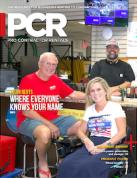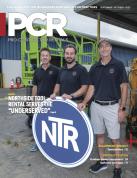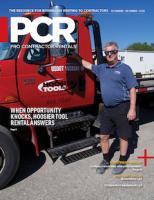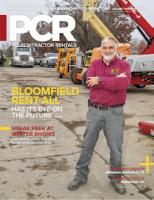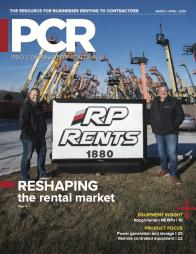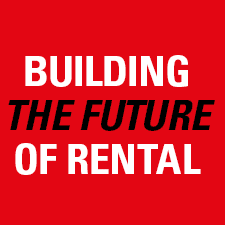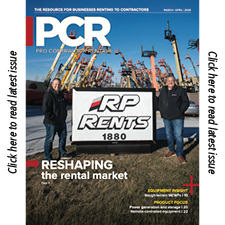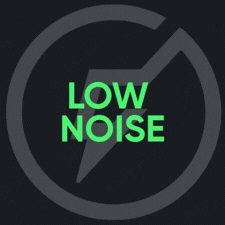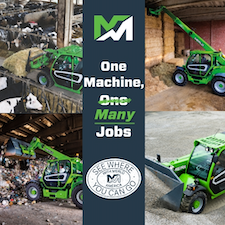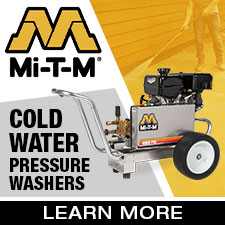Rental Center: Changing lanes in the lift business
Reynolds Equipment moves from a concentration of for-hire crane and rigging service to lifting equipment sales and rentals. Changing customer needs has taken them on this journey.
by Clair Urbain
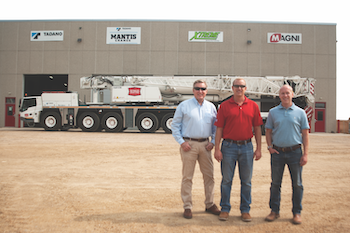 |
| Mark, Nathaneal (Nate) and Nick Reynolds of Reynolds Equipment, the fifth and sixth generations of the family business. |
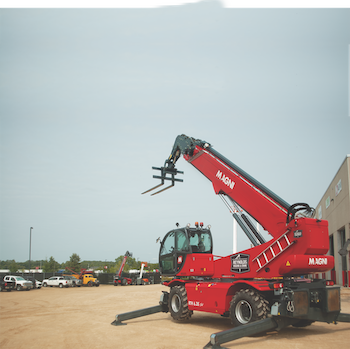 |
|
Rotating telehandlers are redefining how rental customers are doing their jobs. They need less footprint to work and can be outfitted with manlifts, forks and other attachments. |
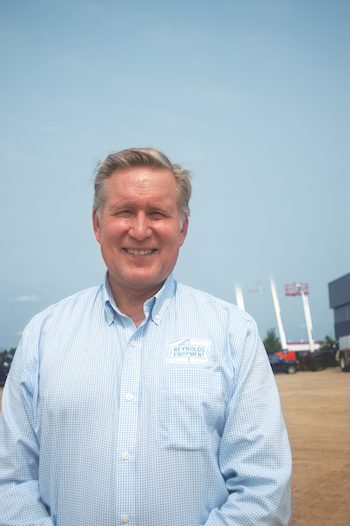 |
|
Mark Reynolds, Reynolds Equipment president and fifth-generation owner. |
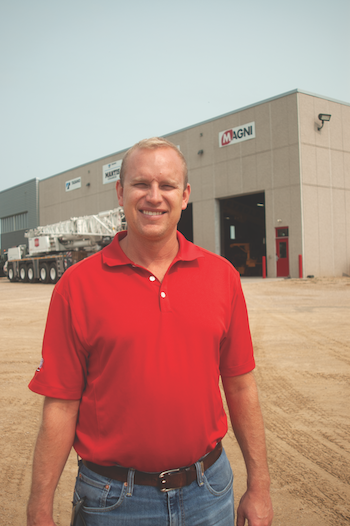 |
| Nathaneal Reynolds. Reynolds Equipment |
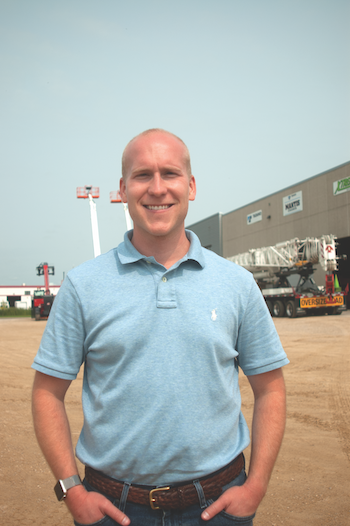 |
| Nick Reynolds, Reynolds Equipment |
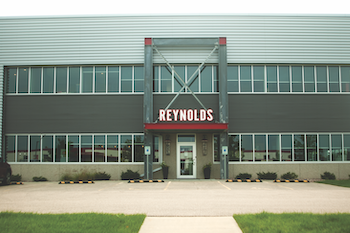 |
| Reynolds Equipment recently moved into a new facility in DeForest, Wisconsin. |
Very few family businesses make it past the second generation, so the story about Reynolds Equipment is even more unusual. This sixth-generation family business, in operation since 1888, began as livery stable and dray line of four horses and two wagons by present president Mark Reynolds’ great-great grandmother, Anna Gault Reynolds.
Like other family businesses, it earnestly worked its way through the turn of the 20th century, two world wars and the Great Depression. After World War II, Henry Reynolds, Mark’s grandfather, purchased the company’s first crane and the family business began focusing on crane work. In 1972, Mark’s father, Edward Reynolds, purchase a Grove TMS 650 to expand the family’s crane services it offered from its base in Madison, Wisc.
“I can remember a few people questioning my father whether or not Madison could support a crane of that size. Thank goodness he had the foresight to make this purchase. It turned out to be a great investment that we still own,” Mark says.
Through the end of the century, the family continued to grow its for-hire crane business, which now stretches from border to border, primarily in the central United States.
While the fleet was initially truck and rough-terrain cranes that came complete with an operator, Reynolds increasingly was asked to provide equipment without an operator. In 2017, Reynolds Equipment was founded, and it began selling and servicing Tadano, Mantis, Snorkel and Xtreme equipment brands; it added Magni rotating telehandlers to its line in 2020.
Today, Reynolds entities rent, sell and service all-terrain, rough-terrain, telescoping crawler and tower cranes, as well as telehandlers, rotating handlers and aerial lifts. Between the equipment company and the hired crane service, Reynolds has 70 people working in the field, ranging from crane operators to salespersons and service and training personnel as well as 15 inside personnel who handle back-office duties.
“We love equipment,” says Nick Reynolds, who works alongside his father, Mark, and brother, Nathaneal (Nate), in the business. “Every day, coming to work we enjoy the people we work with. We all find it very rewarding.”
Market evolution
In the last 10 years, Nate says the company’s customer base has changed. “Our customers are more educated than ever before. They have much more information at their fingertips and they most often now have a good idea what type of equipment they need. Ten years ago, that wasn’t the case; we had to work with them closely on their job site needs so we could make sure they were using the right equipment.”
Today, Reynolds Equipment has more than 150 rental units in the field. “We used to have 20 percent of our business coming from long-term rentals, and 80 percent of the business was daily rentals. That mix of business has flipped in the last 10 years; 80 percent of our business is longer-term rentals,” says Nate. Although crane-for-hire services are still an important part of the Reynolds’ business, the equipment-only rentals and sales make up the majority of its business today.
Move into telehandlers
As customers were increasingly looking for equipment that their workers could operate, telehandlers became the go-to rental unit.
“We’ve added significant number of machines since then. We like to think of ourselves now as a full-service lifting company that offers everything from telehandlers to cranes to aerial lifts,” Mark says.
The Reynolds are finding that contractors are re-thinking how they do their work now that they have access to rotating telehandlers. “Specifically, we have a Magni rotating telehandler on a job site right now with a cell tower contractor who in the past used a traditional telehandler to build the components of the tower on the job site. With the Magni unit, they’re able to set up in one spot and it’s actually changed the way they build towers. Now that they have had some experience with the Magni rotating telehandler, they are rethinking their whole construction process to be even more efficient. I think it’s a tribute to how easy the rotating telehandler is to use once you get the hang of it,” Nick says.
The newer models have rather sophisticated controls built into them, which helps operators prevent misusing the equipment, but also requires more front-end training for Reynolds sales and service personmel, who it turn train customers on proper equipment use.
With some front-end training, Nate says operators can easily calibrate the units to assure accurate lifting ranges for the attachment. “These units can be equipped with a man basket, forks, jibs or other attachments. Being able to do more than one type of job on a construction site appeals to our customers,” says Nate, “One of these units may be able to replace as many as five other pieces of equipment on a job site.”
“The Magni units rely on RFID tags on attachments to communicate to the rotating telehandler which attachment with which it is working. From there, the unit sets operating parameters and helps the operator understand load capacities and limits,” says Mark. “The ability to rotate the turret without moving the whole machine on the ground means the unit doesn’t need as much operating space as a regular fork truck. It’s very impressive and we’ve had very good feedback on it.”
Training takes on more importance
The technology built into these smarter telehandlers can be two-edged sword. “It is harder than a traditional telehandler, obviously. But that’s a big part of what we offer on the front end. Whenever we rent one out, we have the customer send multiple people to our new facility here in DeForest to train the people who are most likely to use it. Plus, we’ll also go to the job site and spend time with the end users to refresh their memory on how to use it and maintain it,” Nate says.
From a dealer standpoint, that extra end-user training also means that the Reynolds staff must be extensively trained. Further, being an equipment dealer for multiple brands means its service people must be trained on those models to fully utilize the diagnostic tools built into today’s equipment.
“We’ve been blessed. I think we have some very talented people who are way above the industry standard, based on what we’ve been exposed to before we became a dealership. I think that’s part of what motivated us to become a dealer. We struggled to have good people perform service on the machines we bought from other dealers. I think it’s proved itself true with our increased activity in the service aspect of the business,” says Mark.
“We have a loyal following of customers who rely on us for their service work,” Mark adds. We’ve always invested in the people and in getting them trained. Today, you can’t find the right person who can do 100 percent of the job you need them to do right away. You have to think ahead, hire somebody before you need them, so by the time that person actually has to go out on a service call, they have already been with one of your other technicians for a year. We’ve never been shy about doing that.”
While the Reynolds place a high value and respect on those with mechanical and technical abilities, they also look closely at the candidate’s communication skills. “I think this portion of our business has changed a little bit, too. It’s not only the crane operating aptitude and skill, or their machinery aptitude, they have to be able to communicate and articulate. Our service people, salespeople, anybody who we have in front of the customer, we look for good communication skills. They need to be able to articulate a point and talk to whomever that operator or person is in the field. It didn’t used to be that way as much years ago. You need to be able to communicate,” Mark says.
COVID-19 effects
Similar to other rental centers, Reynolds Equipment had an initial slow-down for a few weeks in March as the pandemic gained strength and concern. “There were many questions up in the air about what was going to happen. I think it normalized to a fairly decent extent; we are at about where we were in 2019, but what the future is holds, none of us have any idea. It seems we’re starting to price fewer projects out for the end of this year and the beginning of next. It’s still a little too early to tell. I think with the election coming up and with COVID-19, we are in an accelerated cycle right now,” Mark says. “It’s a historic time to be alive. We’ll be citing this event for decades.”
“It’s been hardest on Reynolds salespeople, Nick says. “Not being able to meet with the customers face to face as regularly as they’re used to makes it difficult to keep those relationships fresh. Going to their office, checking out job sites, you just can’t do that right now.”
A look to the future
When Mark looks to the future, his past acts as his rudder. “This gets back to our history. We’re committed, first of all to each other, but we also have a commitment to our customers and our vendors to do things right. With a family business, there’s an added sense of responsibility that I look at as being one of our strong points,” Mark says.
“I see myself as a steward here for a short time, between generations. I want to grow the company, I want to keep it evolving, I want to keep it changing. You have to stay fresh, you have to stay current. You can’t be content. I don’t mean that in a greedy or boastful way; if you’re not growing, you’re falling behind. I feel as though it’s up to each generation to push it, keep pushing it down the road, and to keep improving and keep growing,” Mark concludes.
“We used to have 20 percent of our business coming from long-term rentals, and 80 percent of the business was daily rentals. That mix of business has flipped in the last 10 years; 80 percent of our business is longer-term rentals,” says Nate Reynolds. Although crane-for-hire services are still an important part of the Reynolds’ business, the equipment-only rentals and sales make up the majority of its business today.
This article originally appeared in the November-December 2020 issue of Pro Contractor Rentals magazine. © 2020 Urbain Communications LLC. All rights reserved.




